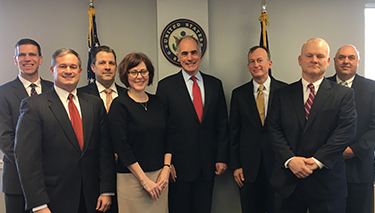PICPA Members Talk Tax Reform and More with U.S. Sen. Bob Casey
When U.S. Sen. Bob Casey (D) came back to Pennsylvania during the February recess, he wanted to talk to CPAs about the accounting industry and the business climate. On Feb. 24 he sat down with seven PICPA members to talk tax reform, IRS funding, and more.
By Maureen Renzi, vice president - communications
When U.S. Sen. Bob Casey (D) came back to Pennsylvania during the February recess, he wanted to talk to CPAs about the accounting industry and the business climate. On Feb. 24 he sat down with seven PICPA members to talk tax reform, IRS funding, the mobile workforce, and the executive order addressing the Affordable Care Act. Members also discussed the CPA pipeline, which lead to a discussion on visas and travel restrictions.
 |
| PICPA members meet with U.S. Sen. Casey: Michael De Stefano, Paul D. Fisher, Jason C. Skrinak, Lisa A. Ritter, Sen. Casey, Joseph E. Seibert, Steven W. Haffner, and Edward R. Jenkins. See more pictures on Facebook. |
One of the most surprising comments made by Casey was related to tax reform. Despite Republican control of the White House, Senate, and House, he predicted that passing “something substantial and meaningful” is unlikely. He thinks some changes could occur through an infrastructure bill and international tax reform. Ed Jenkins, CPA, Federal Tax Committee chair, encouraged Casey to take the ballooning national debt into consideration as any tax proposal is put forth, and work to reduce the debt, not increase it.
A discussion on the Mobile Workforce Act was presented by Jason Skrinak, CPA, a member of the PICPA State Tax Committee who heads RKL’s multistate tax practice. He presented a case outlining the multistate tax burdens for many businesses, and encouraged the establishment of a federal threshold to eliminate some of the burden on small businesses.
When it came to the Affordable Care Act and a recent executive order by President Donald Trump, PICPA members explained how this order placed CPAs who prepare taxes in a tenuous situation. Jenkins wrote a blog explaining this, which was shared with Casey.
Casey also was given an overview of the cash method of accounting and accrual method of accounting. PICPA members noted how previous tax reform proposals included provisions to limit the availability of cash basis and require virtually all service companies using the cash method of accounting to change to the accrual method. CPAs would strongly oppose any proposal that would require the accounting method change, and the PICPA provided a summary of the issue for his consideration.
When the discussion moved to demographics and the CPA pipeline, the issues of visas and travel restrictions arose. The number of visas available for specialized knowledge bases like accounting have been reduced, and travel restrictions will limit the mobility of those working in the United States. This affects the student population, which is significant in Pennsylvania, as well as larger firms.
Underfunding of the IRS was an area that garnered much interest from the Senator as he listened to stories that highlighted the following concerns:
- The slow auditing process has been affecting operational efficiencies of large companies. Audits that took six weeks on average six years ago now take from nine to 12 months.
- IRS staff retirement without appropriate succession coverage can require the auditing process to begin over again multiple times during a transition from retired staff to those assuming the workload.
- Small businesses are not pursuing growth opportunities because they are under audits that are unresolved.
- Because aging and retiring IRS staff are not being replaced, some regional offices have limited staff or have extended their regions, causing additional delays and extended travel requirements.
As this blog is posted, most CPAs with tax practices are busy serving their clients and don’t have time to share their IRS war stories, but the PICPA will be seeking additional stories in the spring and summer. We hope to have additional meetings with Casey in the summer in Philadelphia and Pittsburgh, and plan to provide more Pennsylvania-specific issues that will help provide him with the background he needs as he makes decisions in Washington, D.C.
If you have specific instances related to the need for additional IRS funding, please send your comments to mrenzi@picpa.org, and I will compile them for the next meeting.
PICPA Staff Contributors
Disclaimer
Statements of fact and opinion are the authors’ responsibility alone and do not imply an opinion on the part of PICPA officers or members. The information contained in herein does not constitute accounting, legal, or professional advice. For professional advice, please engage or consult a qualified professional.






